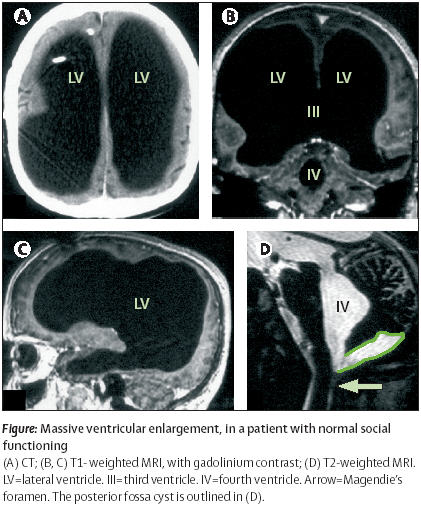You don't need a big brain, or a high IQ, to have a comfortable life and a good family.
Witness the case of this French civil servant, written about by Dr. Lionel Fuillet in The Lancet. At age six months he was treated for hydrocephalus (water on the brain) with a shunt in his head to drain away the fluid. At age 14 he complained of unsteadiness and left leg weakness, which cleared up after the shunt was adjusted. Beyond that his neurological development and medical history were normal.
At age 44 the leg weakness returned and he was treated by Dr. Feuillet and colleagues of the Hôpital de la Timone and Faculté de Médecine, Université de la Méditerranée, Marseille, France.
The CT scan (below) showed the dilation brain’s lateral ventricles while an MRI scan revealed massive enlargement of the lateral third and fourth venricles, a very thin cortical mantle and a posterior fossa cyst.

The man had the remaining tiny space for his actual brain.
Neuropsychological testing revealed he had an intelligence quotient (IQ) of 75, a verbal IQ of 84 and a performance IQ was 70.
The team diagnosed him with non-communicating hydrocephalus, mostly like a congenital defect called a Magendie formation.
"In the sixties, there were no sufficient radiological investigations to show exactly what could have occurred," said Dr. Feuillet. "The best treatment available at his time in case of hydrocephalus was done - ventricuoatrial shunt."
Yet he didn't have any of the usual issues resulting from hydrocephalus - he is not retarded and had no convulsions. He just had the leg weakness when the shunt need to be adjusted. Even that problem went away after the ventricles were drained and adjusted again.
And the mystery patient? A functioning member of French society, proving that, at least when it comes to brains, size does not always matter.